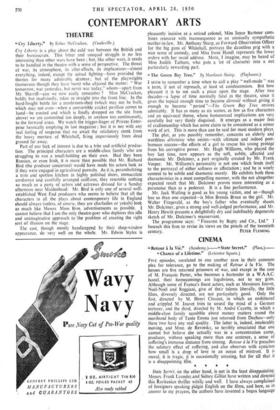CONTEMPORARY ARTS
THEATRE
g1Cry Liberty." By Esther McCracken. (Vaudeville.) Cry Liberty is a play about the cold war between the British and their bureaucrats. This bitter and unequal struggle is no less interesting than other wars have been ; but, like other wars, it needs to be handled in the theatre with a sense of perspective. The threat of war, its atmosphere, its after-effects, its implications—almost everything, indeed, except the actual fighting—have provided the themes for many admirable dramas ; but of the playwrights (numerous though they have been) who abjured the motto: " War tomorrow, war yesterday, but never war today," whom—apart from Mr. Sherriff—can we now easily remember ? Miss McCracken, boldly but inadvisedly, takes us straight into the front line. In the hard-fought battle for a mushroom-shed (which may not be built, which may not even—when a convertible cricket pavilion comes to hand—be erected and which is finally dropped on the site from above) we are committed too deeply, or anyhow too continuously, to the forward areas. We watch the trigger-finger of Private Enter- prise heroically emptying its last magazine ; but it is not with any real feeling of suspense that we await the retaliatory stonk from the heavy mortars of Whitehall, firing imperviously from dead ground far away. Part of our lack of interest is due to a trite and artificial produc- tion. The principal characters are a middle-class family who are struggling to run a small-holding on -their own. Had they been Russian, or even Irish, it is more than possible that Mr. Richard Bird (the producer concerned) would have made his actors look as if they were engaged in agricultural pursuits. As it is, perambulating a trim and spotless kitchen in highly polished shoes, immaculate corduroys and carefully arranged coiffures, they resemble nothing so much as a party of actors and actresses dressed for a Sunday afternoon near Maidenhead. Mr. Bird is only one of several well- established West End producers who seems to believe that all the characters in all the plays about contemporary life in England should always (unless, of cource, they are charladies or yokels) look as much like Messrs. Moss Bros. advertisements as possible. I cannot believe that I am the only theatre-goer who deplores this idle and unimaginative approach to 'the problem of creating the right sort of illusion on the stage.
The cast, though mostly handicapped by their shop-window appearance, do very well on the whole. Mr. Edwin Styles is
pleasantly incisive as a retired colonel, Miss Joyce Barbour com- bines resource with inconsequence as an unusually sympathetic mother-in-law. Mr. Anthony Sharp, as Forward Observation Officer for the big guns of Whitehall, portrays the dauntless prig with a nice sense of comedy, and Miss Irene Handl represents the lower orders with her usual address. More, I imagine, may be heard of Miss Judith Tatham, who puts a lot of character into a not particularly rewarding part.










































 Previous page
Previous page